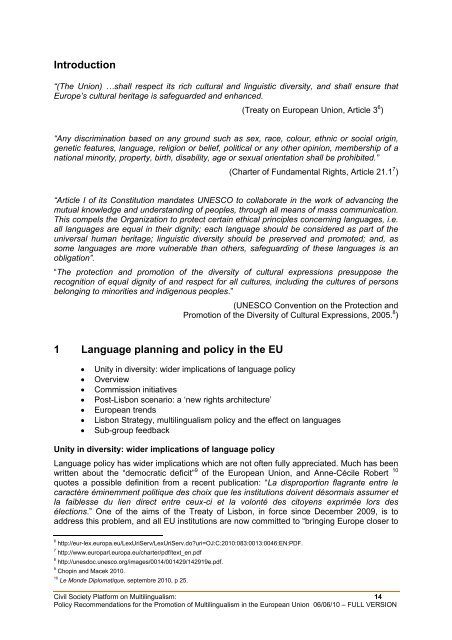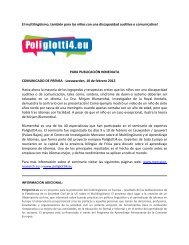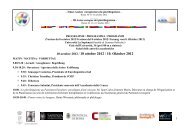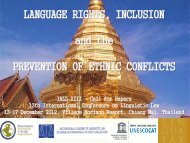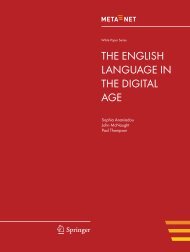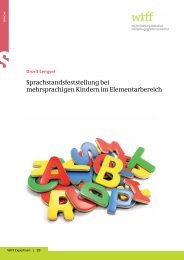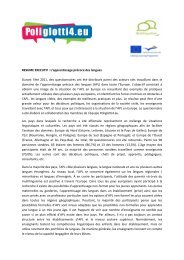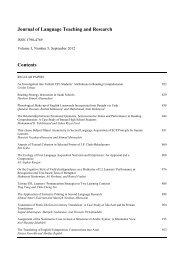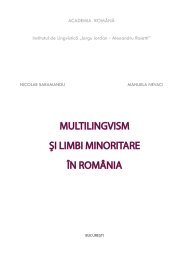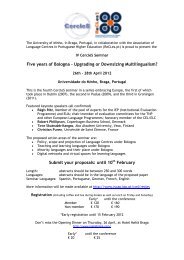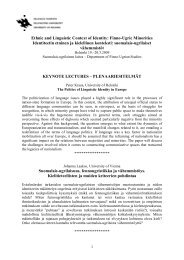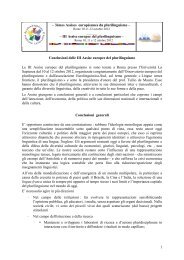Introduction“(The Union) …shall respect its rich cultural and linguistic diversity, and shall ensure thatEurope’s cultural heritage is safeguarded and enhanced.(Treaty on <strong>European</strong> Union, Article 3 6 )“Any discrimination based on any ground such as sex, race, colour, ethnic or social origin,genetic features, language, religion or belief, political or any other opinion, membership of anational minority, property, birth, disability, age or sexual orientation shall be prohibited.”(Charter of Fundamental Rights, Article 21.1 7 )“Article I of its Constitution mandates UNESCO to collaborate in the work of advancing themutual knowledge and understanding of peoples, through all means of mass communication.This compels the Organization to protect certain ethical principles concerning languages, i.e.all languages are equal in their dignity; each language should be considered as part of theuniversal human heritage; linguistic diversity should be preserved and promoted; and, assome languages are more vulnerable than others, safeguarding of these languages is anobligation”.“The protection and promotion of the diversity of cultural expressions presuppose therecognition of equal dignity of and respect for all cultures, including the cultures of personsbelonging to minorities and indigenous peoples.”(UNESCO Convention on the Protection andPromotion of the Diversity of Cultural Expressions, 2005. 8 )1 Language planning and policy in the EUUnity in diversity: wider implications of language policyOverview<strong>Commission</strong> initiativesPost-Lisbon scenario: a ‘new rights architecture’<strong>European</strong> trendsLisbon Strategy, multilingualism policy and the effect on languagesSub-group feedbackUnity in diversity: wider implications of language policyLanguage policy has wider implications which are not often fully appreciated. Much has beenwritten about the “democratic deficit” 9 of the <strong>European</strong> Union, and Anne-Cécile Robert 10quotes a possible definition from a recent publication: “La disproportion flagrante entre lecaractère éminemment politique des choix que les institutions doivent désormais assumer etla faiblesse du lien direct entre ceux-ci et la volonté des citoyens exprimée lors desélections.” One of the aims of the Treaty of Lisbon, in force since December 2009, is toaddress this problem, and all EU institutions are now committed to “bringing Europe closer to6http://eur-lex.europa.eu/LexUriServ/LexUriServ.do?uri=OJ:C:2010:083:0013:0046:EN:PDF.7http://www.europarl.europa.eu/charter/pdf/text_en.pdf8http://unesdoc.unesco.org/images/0014/001429/142919e.pdf.9Chopin and Macek 2010.10Le Monde Diplomatique, septembre 2010, p 25.Civil Society Platform on Multilingualism: 14Policy Recommendations for the Promotion of Multilingualism in the <strong>European</strong> Union 06/06/10 – <strong>FULL</strong> <strong>VERSION</strong>
the citizen”. The <strong>Commission</strong> has done much valuable work in this area, and its initiative insetting up civil society platforms, of which the present report is a product, is a step in the rightdirection. However, the whole question of the possible contribution of language policy tostrengthening a <strong>European</strong> identity in harmony with national and regional identities, and thusbringing Europe closer to the citizen, has been insufficiently addressed by researchers. The<strong>European</strong> Union, as a union both of citizen and of nation states, is considerably morecomplex than any of its component Member States. The present report hopes to assist inclarifying some of the issues surrounding multilingualism. It could thus help the EU, bothinstitutions and Member States, formulate a language policy which can strengthen bothdiversity and unity, and not only in the language area.For this Platform a <strong>European</strong> language policy is a policy meant for the <strong>European</strong> socialspace as a whole, in which all policy levels collaborate in order to realise an accordednumber of political goals. Language policy is and should remain a competence of nationaland regional bodies in the first place, but there is a need for complementary tasks and coordinationon a <strong>European</strong> level. Complementary aspects concern for instance the creation ofmultilingual devices such as multilingual terminology databases, since such aspects gobeyond the competence of one single language area.1.1 Overview“The harmonious co-existence of many languages … united in diversity … enhancedintercultural dialogue and social cohesion … linguistic diversity a precious asset” – the<strong>Commission</strong> Communication on Multilingualism of September 2008 11 does not define“multilingualism”, but its thrust is apparent from the aforementioned phrases. As some termshave been used differently, and with different political and ideological loading, it is useful toinclude some definitions of what precisely those terms mean in this report.Multilingualism indicates the presence of “many” languages at the societal level – it is distinctfrom both monolingualism, the use of one language, and bilingualism/diglossia, thelearning/societal use of two languages. Plurilingualism refers to a similar concept at the levelof the individual citizen, i.e. the learning by the citizen of the mother tongue and at least twoother languages, the “mother tongue plus two” formula of the Barcelona <strong>European</strong> Council of2002 12 , which is the accepted goal of EU multilingualism policy.The report of the Work group on Language Planning and Policy of the Civil Society Platformto promote Multilingualism (hereinafter referred to as the “Platform”) seeks to build on the<strong>Commission</strong>’s valuable work on multilingualism policy. Above all, it aims to bring to bear theviewpoint of the citizen and of civil society, and is thus citizen-centred, i.e. it accepts thefreedom of each individual citizen to study, or not to study, languages. The promotion ofmultilingualism, with which the Platform has been tasked by the <strong>European</strong> <strong>Commission</strong>, musttake place within the democratic framework of the 27 EU Member States, respecting all theprinciples enshrined in the EU treaties. The report is inspired by the many responsesreceived from citizen of most EU Member States by the Platform’s 29 constituentorganizations to a number of detailed questionnaires sent to their members throughout theEU.Following an analysis of the questionnaires returned, a number of key areas of concern tocitizen became apparent. First, there is widespread support for linguistic diversity andmultilingualism, and for the measures being taken by the EU institutions and Member Statesto promote it. Secondly, however, there is also some concern that multilingualism may nowbe threatened by the dominance of one language, English, coupled with a desire to make thepromotion of multilingualism more effective. Some respondents pointed out that support fordiversity may be misunderstood as opposition to English. The important distinction isperhaps best made clear by likening English to a red rose, a very beautiful and popular11http://ec.europa.eu/education/languages/pdf/com/2008_0566_en.pdf.12http://ec.europa.eu/education/languages/pdf/doc786_en.pdf.Civil Society Platform on Multilingualism: 15Policy Recommendations for the Promotion of Multilingualism in the <strong>European</strong> Union 06/06/10 – <strong>FULL</strong> <strong>VERSION</strong>


